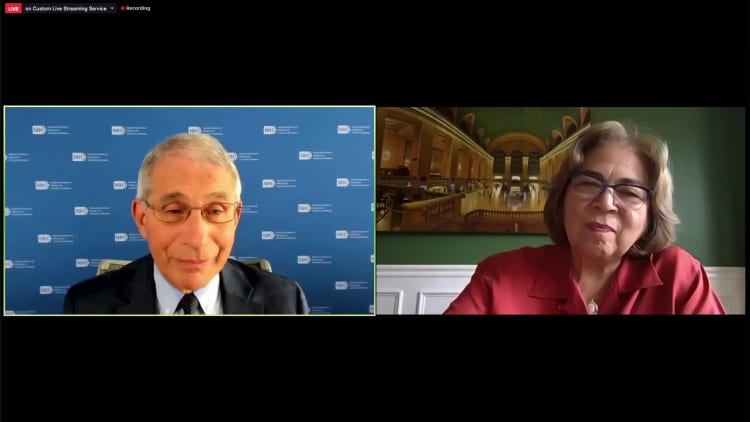SINGAPORE — With several Covid-19 vaccine candidates showing promising trial outcomes, investors and analysts have turned increasingly optimistic that the pandemic could soon come to an end.
But a Monday report by Citi Research showed that the economic benefits of vaccination may not kick in until late 2021, when "herd immunity" is expected to start forming. Herd immunity occurs when enough people in a population develop protection against a disease that it can no longer spread easily among them.
The report, written by Citi economists, drew on a paper in the American Journal of Preventive Medicine that simulated the percentage drop in daily Covid-19 cases under various scenarios of vaccine efficacy and coverage.
The paper, Vaccine Efficacy Needed for a COVID-19 Coronavirus Vaccine to Prevent or Stop an Epidemic as the Sole Intervention, concluded that vaccines must have an efficacy of at least 70% to prevent an epidemic and at least 80% to "largely extinguish" an epidemic without any other measures.
Among the current vaccine frontrunners, Pfizer-BioNTech and Moderna reported preliminary results showing that their respective candidates were around 95% effective. Meanwhile, Oxford-AstraZeneca said an interim analysis showed their vaccine having an average efficacy of 70% in protecting against the virus.
The Citi analysis assumes those three vaccine candidates would receive emergency approvals between next month and January 2021 — which would allow the pharmaceutical companies to produce and distribute their vaccines.
The economists said that developed economies, many of which have secured vaccine pre-orders, will first experience the economic benefits of herd immunity.
Overall, the bank has forecast that Covid-19 vaccination could raise global economic growth by 0.7 percentage points in 2021, and 3 percentage points in 2022 as activity returns to normal.
Developed vs. developing nations
According to Citi, developed markets have collectively secured 85% of total bilateral pre-orders of Covid-19 vaccines. Countries such as the U.S., U.K., Japan, Canada, Australia and those in the European Union have ordered supplies that exceed their populations, the analysts added.
That means major developed economies could start wider distribution of the vaccines in the second or third quarter next year, and form herd immunity by the final three months of 2021, they explained.
"Most people, who seek vaccination, may be vaccinated at least by the end of 2021," said the analysts.

Normalizing economic activity is projected to raise growth in developed markets by 1.2 percentage points in 2021 and 3.9 percentage points in 2022, said Citi.
In comparison, emerging markets could see growth increase by 0.1 percentage points in 2021 and by 2 percentage points in 2022, projected the bank.
The smaller economic benefits in emerging markets are partly because some countries, especially those in Asia such as China, have contained the virus and allowed most activity to resume, Citi explained. In addition, vaccine distribution may take a longer time to reach emerging economies, with lower-income countries potentially having to wait until end-2022 or even later, the bank added.
Emerging markets may have to rely on the Covax facility for vaccine supply, Citi analysts said, referring to the United Nations' program that will subsidize rollouts of Covid-19 vaccines to low-income countries.
Vaccine acceptance
Citi said there are uncertainties that could alter the timing of its forecasts for when herd immunity will be reached.
Those factors include:
- Efficacy of vaccines and Covid-19 reproduction rate, which refers to the number of people that an infected individual goes on to infect.
- The speed at which mass production of vaccines can be ramped up.
- People's acceptance to a vaccine.
The bank, citing a survey by Ipsos and the World Economic Forum, pointed out that vaccine acceptance appeared to have fallen in recent months. The survey conducted in October found that 73% of respondents across 15 economies intend to get vaccinated — 4 percentage points fewer than the same survey done three months earlier.
"In general, vaccine coverage should reach at least 70% to form some herd immunity," said Citi.
"However, vaccine acceptance rates of 54%-59% in France, Hungary, Poland and Russia suggest potential delays in the timing of herd immunity by vaccination in some countries."


